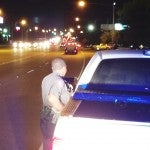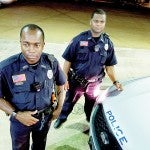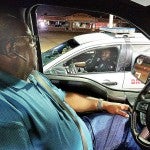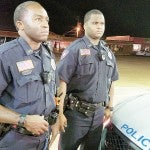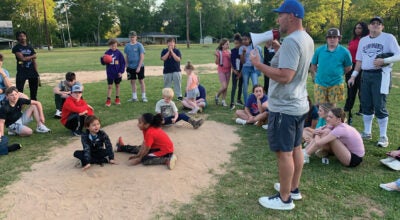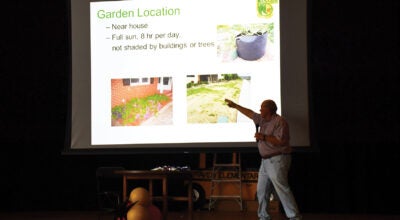‘We call this Mayberry country’
Published 10:05 pm Saturday, July 30, 2016

Photos by Donna Campbell/Brookhaven police officer Jonathan Buie II watches traffic on Brookway Boulevard Friday night. Police Chief Bobby Bell said most of his officers have been given nicknames by the younger folks they protect and serve. Buie is known on the street as “Showtime.”
Brookhaven’s top law enforcement officer doesn’t like to ever say ‘It’s quiet.’”
That’s a sure fire way to get more calls than his officers can handle in an eight-hour shift.
But on Friday night, when Police Chief Bobby Bell patrolled the city he loves, the serious calls were few and far between.
Bell tooled around town in his four-month-old 2016 Ford F-150, maneuvering the gray truck past well-manicured lawns on the west side of town and then over on the east side where the yards are sometimes just dirt. He waved at anyone he passed, no matter their location or housing situation.
These are his people that he vowed 35 years ago to protect and serve.
As chief, he takes his responsibilities to the city known as the Homeseeker’s Paradise seriously.
“All this is on your shoulders,” he said of himself. “You’re responsible for all these people’s safety. Sometimes, it gets scary. Most of the people are going to do what’s right. You have a few that’s going to try to do the wrong thing or try to beat the system.”
Even when it’s quiet, though, officers stay ready for any situation. More so after the recent fatal shootings of police in Dallas, Baton Rouge, Kansas City and San Diego, he said.
“They can never let down their guard. You want to go home to your family, so you have to stay on your Ps and Qs,” he said. “When I first started, you didn’t think about being shot. It was very seldom that we’d run across somebody with a gun in their vehicle. But now everybody has a gun. You have kids that’s not 15 years old now carrying guns.
“You realize you’re in a different location, but the same thing can happen to you. A lot of people think that it’s hatred, but a lot of it is mental illness.”
Four quadrants to patrol
Police divide Brookhaven into four quadrants, with officers patrolling each area during his or her shift. If an officer needs assistance, he’ll make the call for backup.
Any disturbance call requires at least two officers.
At least five officers work each of the three shifts, more on the busier nights like weekends.
His officers wear body cameras on their uniforms and each squad car has a dash cam that begins recording when the blue lights come on. He hopes to purchase computers for each car in the next few years.
Besides their standard issue handguns, officers carry pepper mace guns, which can shoot burning spray at the same velocity as a 9 mm bullet. The spray can reach 35 feet from the canister.
Bell began his ride through his quadrant around 6:30 p.m, driving slowly along the streets on the west side of town before heading to the east. He and the other officers change up their route so that anyone watching them won’t know when they’ll be coming by.
Officers rotate their quadrants so they are familiar with the whole city. “Every officer knows the City of Brookhaven,” he said.
They are looking for anything out of the ordinary.
“You’re looking for broken glass and doors open, lights on in vehicles,” he said.
The night before, he spotted someone’s trunk open and stopped to let the homeowner know.
“We call this Mayberry country,” he said. “But it’s changing. It’s changing because you have people who don’t want to work and want something for nothing. They are watching you to see what you are doing. They’re going to come and check your vehicles to see if you’re locking your vehicles. They’re going to try to get something that they can sell or trade for drugs, or get a little money for.”
As he crosses over from the west side to the east side, he notes that the houses are much closer together. Groups of people gather in various yards, standing around talking and drinking. Bell blows the horn and waves at many, making a point to make eye contact. He knows a lot of them.
Bell thinks alcohol-related ordinances need to be updated — it would keep adults from drinking out of cans and bottles near city streets. He doesn’t mind a cup as much.
“We have a place on Martin Luther King, and our kids, it bothers me so much because when our kids get up and go to school and get on that bus the first thing they see is people out on the street drinking around a 55-gallon drum. And then when they come home from school they see the same thing,” he said.
It sets a bad example for the youth. “There’s nothing positive in it,” he said.
Calls are increasing
Call volume has increased over the years. When he started on the force at 23, officers would respond to 15 or 20 calls in a month. The department has received more than 8,000 from Jan. 1 until July 1.
They get calls about dogs barking, loud music, even naked people running around — though that wasn’t one of Friday night’s calls.
One regular caller will summon them to her home daily to check for an intruder. “Our guys have learned how to deal with these people. Some of our officers will go by her house before she calls,” he said.
Bell encourages the public to call them if they’re needed. “Anytime you feel like something is not right or makes you feel uneasy, give us a call,” he said. “We handle every call that a person calls in.”
Bell said calls tend to be more violent during full moons — it was a crescent moon Friday night — and at the first of the month, when people get paid, police will see an increase in alcohol-related calls.
The streets seem narrower on the east side of Brookhaven.
Some homes he passes are freshly painted with flowers in the yard. Other houses seem to be falling down, with junky yards and aluminum foil in the windows. He thinks a little community pride in these neighborhoods would go a long way.
“Back in the old days, we didn’t have much, but one thing we would do is find a gallon of paint and paint our house and try to make it look decent. But now we’ve just kind of lost our pride for a while. I just hope it’s not gone long.”
He said the close proximity of individuals to each other in some neighborhoods can cause problems.
“I think crime has a lot to do with folks being too close, and under each other,” he said. “It’s like the more space you have between you, the more you tend not to argue and fuss.”
That’s why officers respond to a lot of calls in apartment complexes and trailer parks. Folks are just too close to each other, he said.
Officers patrol the areas in the Brookhaven Housing Authority, usually parking for a while near a basketball court full of young children and teenagers before it gets too dark. “Sometimes we’ll get out and dribble a ball. You try to get along with them and try to make the little kids feel like you’re watching them.”
He often sees children as young as 6 or 7 years old walking along the public housing streets as late as 11 p.m.
“They’ll be out all times of night. It goes back to parenting,” he said.
Brookhaven has had its share of homicides as well. Most were drug related, Bell said, though one unsolved murder they’ve marked as a cold case was not.
Bridget London Hall, a 43-year-old mother, was gunned down in her home on Vivian Merritt Street, which is near Mamie Martin Elementary School.
Detectives have pieced together what they think happened, and even had a suspect to present to the grand jury. But he was murdered, Bell said.
Hall was an innocent victim, he said. “That one will probably never be solved,” he said.
In 2015, a man shot members of a family who had taken him in. He fatally shot the father and a 9-year-old child. The mother and two other children were seriously injured. He was arrested at the scene, Bell said.
“This guy had mental problems and he ended up dying in jail,” Bell said.
Other murders police have investigated through the years are mostly drug related, he said.
He’s declared a war on drugs in the city — crack, cocaine, methamphetamine, even some heroin — but it hasn’t been easy.
There’s a code of silence and witnesses don’t talk, he said.
“Other than Bridget London (Hall), there’s not anyone else who has been killed in our community that hasn’t been talked to by police or have not been warned that there’s a possibility of them getting killed or hurt from the way that they’re living. As a police officer, I’ve always taken pride in talking to kids about what they’re doing and how they should do it,” he said.
“Basically I just hope we can come together and make our community safe. Police officers aren’t going to be able to do it by themselves. It’s going to take the whole community deciding that we’re all going to do the right thing, and we all want the right thing for our kids. We need to do it for our kids and our grandkids. We need to make life easier for them and better for them. In order to do that we’re going to have to stop being selfish and stop letting things get by us without reporting it.”
He said the code of silence has to stop.
“We’re going to have to take pride in what’s going on in our community and try to straighten this problem out,” he said. “People in the community are going to have to stand up and say ‘I’m fed up and we’re going to take our community back. Any crimes we see, we’re going to report it.’”
As darkness fell on the city of about 12,400 people, the calls became more serious.
Police responded to a domestic call at a trailer park. Bell arrived to find at least five squad cars and as many officers talking to the complainant and witnesses.
A group of women had gotten into an argument and a young man slapped one of them in the face. He admitted it. Officers talked to the parties involved and then went on their way.
“Most people think it’s about taking people to jail. But it’s not. You’re here. You’re a counselor. You’re a mom. You’re a dad. You’re so many things,” Bell said.
The goal is to diffuse situations and prevent them from escalating. Sometimes that’s all it takes. Sometimes that’s not enough.
Officers were back at the trailer park an hour later, and took one of the women into custody.
Shooting investigated
Bell heads to a shooting around 10:30 p.m. on Center Street.
“We’ve got blood inside this vehicle,” an officer is heard saying on the scanner in Bell’s truck. “Whoever was in it has been hit. We’ve got a person who has probably been shot in this vehicle. They’re not here. I don’t see them.”
When Bell arrived, officers were talking to witnesses, but not a lot of information was shared. The complainant said someone shot at him, but gave them very little information about who it was.
What they figured out, though, is that while the SUV parked at the residence had been shot, the driver had not. They determined another man was picking up his son and someone hit him in the head and tried to rob him. That’s where the blood in the vehicle came from. However, the victim was nowhere to be found.
Bell told them to tow the SUV. “The reason I had the vehicle towed, that person’s going to come looking for his vehicle. It might not be tonight, but it will be soon. We’ll get a story from him,” he said.
Incidents like this can eventually lead to a more violent crime, even a murder, he said.
A few streets over, Bell stopped two young men, about 16 or 17, talking on cell phones while standing in the middle of a street. Bell, who usually rides with his window down, heard one of the boys say something disrespectful to two girls with them. The girls just giggled, but Bell took it seriously.
“Hey, watch your mouth,” he told him.
The boy just stared at him.
Bell knows most of the people in the town. Those he doesn’t know he’ll ask their names.
“You there, who are your people?” he asked a group of about five older teenagers sitting near the curb on South Railroad Avenue around 11:30 p.m. They were waiting for rides to pick them up from their friend’s apartment.
Satisfied with their answers, he drove on.
“We have some good people here,” he said. “If you could pluck about 10 people out of this town, it would be a perfect place.”
Bell’s dilemma is that he knows who those people are. Getting them off the streets is the struggle.
He said he’ll keep trying, though.
And in the meantime, he’ll continue to try to reach the younger generation, to prevent them from becoming criminals later on.
“You can’t give up on them. If you give up on them, there’s no hope,” Bell said.



